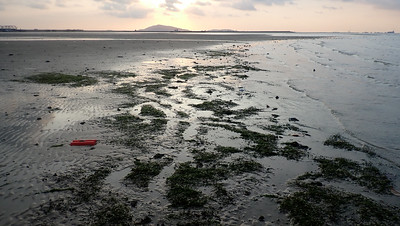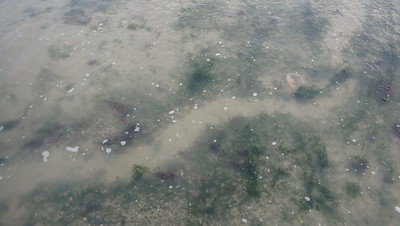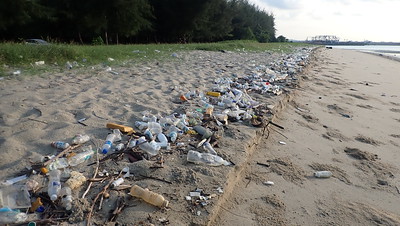 |
| The shore is vast: in the distance is Chay Hoon on the sand bar. |
I was delighted not only to see seagrasses here, but also dugong feeding trails! This was on the southern corner of the shore, where there were patches of lush Spoon seagrass (large leaves) growing all along the shore nearer the high shore. There were also sprinkles of Needle seagrass, and I saw washed up Tape seagrass blades, quite long leaves.
Here's a closer look at the feeding trail. Dugong feeding trails are formed when dugongs chomp up seagrasses including their roots, leaving a shallow meandering furrow of about equal width and depth.
Yesterday, Kok Sheng saw a clump of Tape seagrass and Noodle seagrass on the northern corner of this shore.
We started well before sunrise, surveying the sand bar that was now huge in the receeding tide. The most abundant were enormous moon snails with all white shells. Scarily erupting out of the sand, and extending large fleshy 'arms'. I think they may be Egg-white moon snails. There were also other kinds of moon snails: the more surely Egg-white moon snails with coloured shells (dark red to pink), Ball moon snails, one Lined moon snail, one Naked moon snail and one Bosom moon snail.It was intriguing to come across this large moon snail next to a sand collar - which is the egg mass of a moon snail. The mama moon snail lays eggs singly in capsules which are embedded in a matrix of sand grains - a combination of mucus and sand which forms a gelatinous sheet that hardens. She lies at the center of the collar as she creates it, so the hole in centre of the collar may give an indication of the size of the mother snail. Did this moon snail just lay the sand collar? Wow!
Burrowing in the sand bar were also other kinds of snails. I was surprised to see many Gong gong snails buried in the sand. Some of them had enormous encrustations on their shell, and were not buried. There were many Noble volutes of various sizes with beautiful unencrusted shells, many busy Weasel olive snails. I saw some Margined conch snails, one Grey bonnet snail and one Fig snail. I saw the empty shell of a Baler snail. The rest of the team saw a live Baler snail yesterday.There were also other molluscs on the shore. At the area where there are seagrasses, there were some Fan shell clams (very heavily encrusted) and many Window pane shell clams (small and large). On the sand bar, I saw a very large Large cockle and several small Big brown mactra clams. There were also very many Attap chee slugs - smaller than usual. These slugs are believed to feed on small clams. Studies suggest this slug is seasonally abundant and voracious predators of clams.Like most northern shores, echinoderms are abundant here. Most of them here were those that burrow into the sand. The most abundant were Cake sand dollars! There were also many large sand dollars that look like Keyhole sand dollars, with slots in the body. But these are a more rarely seen kind, possibly Echinodiscus auritus. I also saw several living Thick-edged sand dollars. There were many large sea cucumbers buried in the sand, including Remarkable sea cucumbers, Smooth sea cucumbers and Ball sea cucumbers. I saw several Painted sand stars and a large Common sea star. Yesterday, the team saw a small Knobbly sea star, the sand star with bright orange feet, as well as heart urchins.There were also burrowing cnidarians on the sand bar. I saw a few Haddon's carpet anemones, one Pearly anemone and one Very long sea anemone. There were also some Sea pencils and one cerianthid. There were many Orange-striped hermit crabs, small Flower crabs and Spotted moon crab in the shallow water. While a lot of Horned ghost crabs foraged all over the shore.As the tide turned and I was leaving, I noticed these pawprints emerging from the sea, and heading for the shore. I suspected they were made by otters.
And indeed, Chay Hoon and I saw them playing in a natural pond nearby. They were far away and we didn't want to disturb them, so here's a bad video of them.
Kok Sheng also saw them yesterday.
Our recreational shores are cleaned daily. So on an untouched shore like this one, the build up of floating trash is clearer. Among the most common items in the trash were single use water cups - which are served on ferries. Ferries that pass by this shore are not provided with trash collection at Tanah Merah Ferry Terminal.
I first returned to this shore for the first time in ten years in Dec 2020. Previous trips to these shore were in Nov 2011, Oct 2011, quick visit in Oct 2011, Jan 2010, first trip in Jan 2010.
Photos of the survey today
Chay Hoon
Photos of the survey of the same shore done yesterday
Loh Kok Sheng
Jianlin Liu
Jonathan Tan
Other shores surveyed today
Kok Sheng surveyed another part of Changi











